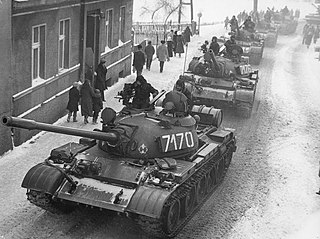
Martial law is the imposition of direct military control of normal civil functions or suspension of civil law by a government, especially in response to a temporary emergency where civil forces are overwhelmed, or in an occupied territory.

The Constitution for the Kingdom of the Netherlands is one of two fundamental documents governing the Kingdom of the Netherlands as well as the fundamental law of the European territory of the Kingdom of the Netherlands. It is generally seen as directly derived from the one issued in 1815, constituting a constitutional monarchy; it is the third oldest constitution still in use worldwide.
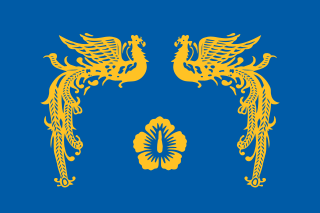
The president of the Republic of Korea is the head of state and head of government of South Korea. The President is the head of the executive branch of the government of South Korea as well as being the commander-in-chief of the Republic of Korea Armed Forces.
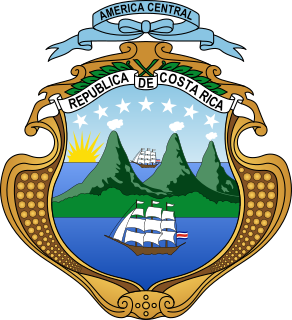
The President of the Republic of Costa Rica is the head of state and head of government of Costa Rica. The president is currently elected in direct elections for a period of four years, which is not immediately renewable. Two vice presidents are elected in the same ticket with the president. The president appoints the Council of Ministers. Due to the abolition of the military of Costa Rica in 1948, the president is not a commander-in-chief, unlike the norm in most other countries, although the Constitution does describe him as commander-in-chief of the civil defense public forces.

A state of emergency is a situation in which a government is empowered to be able to put through policies that it would normally not be permitted to do, for the safety and protection of their citizens. A government can declare such a state during a natural disaster, civil unrest, armed conflict, medical pandemic or epidemic or other biosecurity risk. Justitium is its equivalent in Roman law—a concept in which the Roman Senate could put forward a final decree that was not subject to dispute yet helped save lives in times of strife.

The Constitution of the Czech Republic is the supreme law of the Czech Republic. The current constitution was adopted by the Czech National Council on 16 December 1992. It entered into force on 1 January 1993, replacing the 1960 Constitution of Czechoslovakia and the constitutional act No. 143/1968 Col., when Czechoslovakia gave way to the Slovak Republic and the Czech Republic in a peaceful dissolution.
A state of emergency India refers to a period of governance under an altered constitutional setup that can be proclaimed by the President of India, when the consultant group perceives and warns against grave threats to the nation from internal and external sources or from financial situations of crisis. Under the advice of the cabinet of ministers and using the Constitution of India, the President can overrule many provisions of the constitution, which guarantee fundamental rights to the citizens of India and acts governing devolution of powers to the states which form the federation. In the history of independent India, a state of emergency has been declared thrice. The first instance was between 26 October 1962 to 10 January 1968 during the India-China war, when "the security of India" was declared as being "threatened by external aggression". The second instance was between 3 to 17 December 1971, which was originally proclaimed during the Indo-Pakistan war. It was later extended along with the third proclamation between 25 June 1975 to 21 March 1977 under controversial circumstances of political instability under Indira Gandhi's prime minister-ship, when emergency was declared on the basis of "internal disturbance", but this term was too vague and had a wider connotation and hence 44th amendment act 1978 substituted the words "internal disturbance" for "armed rebellion" ". The phrase Emergency period used loosely, when referring to the political history of India, often refers to the third and the most controversial of the three occasions.

The Constitution of the Italian Republic was enacted by the Constituent Assembly on 22 December 1947, with 453 votes in favour and 62 against. The text, which has since been amended sixteen times, was promulgated in an extraordinary edition of Gazzetta Ufficiale on 27 December 1947. The Constituent Assembly was elected by universal suffrage on 2 June 1946, on the same day as the referendum on the abolition of the monarchy was held. The election was held in all Italian provinces. The Constitution was drafted in 1946 and came into force on 1 January 1948, one century after the Constitution of the Kingdom of Italy, the Statuto Albertino, had been enacted.
The German Emergency Acts were passed on 30 May 1968 at the time of the First Grand Coalition between the Social Democratic Party of Germany and the Christian Democratic Union of Germany. The Emergency Acts faced opposition from outside the German parliament. It was the 17th constitutional amendment to the Grundgesetz, adding emergency clauses to ensure the federal government's ability to act in crises such as natural disasters, uprisings or war.
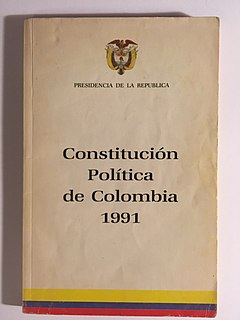
The Political Constitution of Colombia of 1991, is the Magna Carta of the Republic of Colombia. It was promulgated in Constitutional Gazette number 114 on Thursday, July 4, 1991, and is also known as the Constitution of Human Rights. It replaced the Political Constitution of 1886 and was issued during the presidency of the liberal César Gaviria. With ideas from the also liberal Luis Carlos Galán.

The Hellenic Parliament, in Greek known as Voulí ton Ellínon is the parliament of Greece, located in the Old Royal Palace, overlooking Syntagma Square in Athens. The Parliament is the supreme democratic institution that represents the citizens through an elected body of Members of Parliament (MPs).

The president of Artsakh is the head of state and head of government of the de facto Republic of Artsakh.

The Constitution of Kosovo, refers to the supreme law of the Republic of Kosovo. Article four of the constitution establishes the rules and separate powers of the three branches of the government. The unicameral Assembly of the Republic exercises the legislative power, the executive branch led by the President and the Prime Minister which are responsible for implementing laws and the judicial system headed by the Supreme Court.
The law of the Republic of China as applied in Taiwan is based on civil law with its origins in the modern Japanese and German legal systems. The main body of laws are codified into the Six Codes:
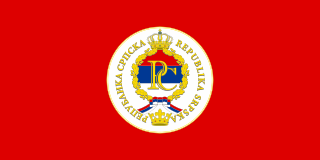
The President of Republika Srpska is the highest executive authority in Republika Srpska, an entity in Bosnia and Herzegovina. It is one of the executive authorities, along with the Government of Republika Srpska. The president of Republika Srpska is directly elected for a term of four years, along with two vice presidents from different constituent nations. None of them can be from a same constituent nation at the same time. The president's residence is in Banja Luka.
Part Three of the Constitution of Albania is the third of eighteen parts. Titled The Assembly, it is divided into 4 chapters that consist of 22 articles.
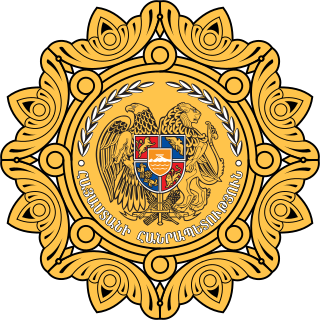
The president of Armenia is the head of state and the guarantor of independence and territorial integrity of Armenia elected to a single seven year term by the National Assembly of Armenia. Under Armenia's parliamentary system, the president is simply a figurehead and holds ceremonial duties, with most of the political power vested in the Parliament and Prime Minister.
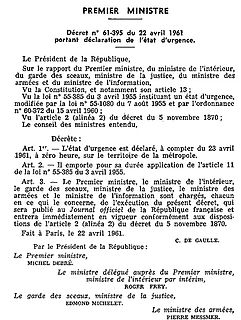
States of emergency in France are dispositions to grant special powers to the executive branch in case of exceptional circumstances. A state of emergency was declared following the November 2015 Paris attacks, which expired, after five extensions, in November 2017.
Martial law in Russia is defined in the Russian law as a special legal regime that is introduced in conditions of external aggression or its threat. In this way, it differs from the state of emergency, which is introduced in the event of an internal threat such as an attempted coup, unrest or disaster. Martial law should also be distinguished from the State of War- a term that refers to the period between the outbreak of hostilities and their end. The procedure for introducing and abolishing martial law in Russia is defined in the federal constitutional law “On Martial Law” (2002). In modern Russia, martial law has never been introduced.
State of emergency in Russia is a special legal regime that is introduced in the country or its individual regions to protect against an internal threat. The state of emergency involves restricting the rights and freedoms of citizens and legal entities, as well as imposing additional duties on them. In this case, the state of emergency, which is introduced in the case of violent unrest or clash, coup attempt, natural disaster or man-made disaster, should be distinguished from the martial law regime that is introduced in the event of external aggression.














